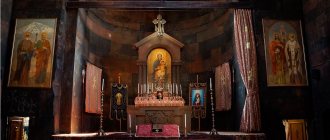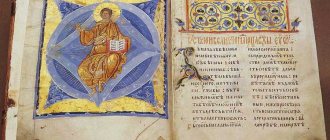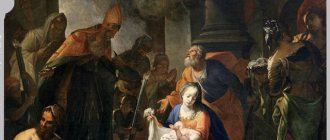"Save me, God!".
Thank you for visiting our website, before you start studying the information, please subscribe to our Orthodox community on Instagram, Lord, Save and Preserve † - https://www.instagram.com/spasi.gospodi/. The community has more than 60,000 subscribers. There are many of us like-minded people and we are growing quickly, we post prayers, sayings of saints, prayer requests, and timely post useful information about holidays and Orthodox events... Subscribe. Guardian Angel to you!
Many Orthodox traditions developed thanks to the existence of the monastic movement in the first centuries. An interesting fact is that the total number of fasts in the Orthodox calendar is almost 120 days. In addition to them, there are also other canonical rules, according to which additional days of fasting are regulated.
It should be noted that Jesus Christ once spoke out against them. Because they were a burden for many believers. But at the same time, since ancient times, a bright tradition has also been preserved, which gave Orthodox believers the opportunity not to grieve, but to love and enjoy life. This mentality was called the seventh by Jesus Christ.
Posts
To better understand what a continuous week is, it is important to understand how the Orthodox calendar works. There are 4 multi-day fasts in Orthodoxy: Nativity, Petrovsky, Dormition and Great Orthodox Lent. The Nativity fast always lasts from November 28 to January 6. Lent always lasts 48 days, but its boundaries shift depending on the day of Easter.
Orthodox Christians also fast on Wednesday and Friday every week. It is also recommended to fast for 3 days before communion. But there are exceptions to the rules. For example, relaxations in fasting for sick people, pregnant and nursing mothers, and travelers.
What is the meaning of weeks
Weeks, as you can see, are very different from fasts
But they are also of great importance - the main thing is to observe them correctly. If fasting is a time of purification, immersion in self-analysis and the opportunity to overcome one’s weaknesses, then such weeks provide an opportunity to relax, allowing one not to forget about the joys of the world
However, you should still rest wisely - do not forget about the meaning of each of the weeks and honor the traditions of the celebrations.
If you still have questions about the topic of the weeks, you can contact the clergy in the church, who will always help, explain and strengthen your faith in the Lord.
Solid weeks
One of these exceptions is just continuous weeks. What is a continuous week? This is a week in which the usual Christian fast on Wednesday and Friday is not observed. If a person is going to take communion during the whole week, he is allowed not to fast before communion. In calendars, continuous weeks are either designated with a special color, or are distinguished by the fact that on all days there are no symbols indicating fasting, and the cells with dates usually remain white. Such weeks mark great holidays or prepare for long fasts.
There are five such weeks in a year. When can Orthodox Christians expect Continuous Weeks in 2021?
What can you eat on Bright Week after Easter?
At this time, it is better to have time to confess and take communion; breaking the fast is considered an optional attribute of the Easter fast. Lay people observing Lent can eat whatever they want during this period: traditional Easter cakes (butter cakes), Easter cottage cheese, chicken eggs, meat, fish and other products. There are no dietary restrictions during this time.
But parishioners should take into account that the clergy of churches advise observing moderation in everything and not turning this happy time into a continuous celebration. The consumption of alcoholic beverages these days should be, if not excluded, then radically limited. You shouldn’t deny yourself fun and entertainment, but there should be moderation in everything.
Christmastide
This period lasts every year from January 7 to January 18, that is, from the Nativity of Christ until the eve of the day of Epiphany. Calling it a continuous week is not entirely correct - after all, Christmastide lasts for 11 whole days! Christmastide is a word that tells us about Russian traditions. It was customary to spend these days having fun, visiting each other. During this winter period, people sledded and played snowballs. No work was carried out except the most mundane and necessary, and the youth could celebrate. So you can even consider traditional Christmastide an analogue of modern winter holidays. Caroling was widespread - when children and sometimes young people went from house to house and sang church chants. At Christmas time it was customary to tell fortunes. This period was associated with mysticism and, oddly enough, dark forces. Apparently, it was influenced by the belief that from Christmas to Epiphany is a time “without a cross,” when the Infant has not yet been baptized, despite the fact that the Savior was baptized as an adult, at the age of 30. But the Church did not approve of fortune telling and passion for mysticism. What is a continuous week? This is not a pagan custom at all, but a decree of the Church, and therefore it should be carried out within the framework of Orthodox traditions.
Week of the Publican and the Pharisee
It is called that because the triodion “about the publican and the Pharisee” is read in churches. This is the preparatory week before Lent, and it encourages believers to look within themselves and evaluate whether we extol our achievements too much before God, whether we compare ourselves with others, whether our hearts are open, whether we are full of repentance. The parable of the publican and the Pharisee tells about two people who came to the Temple. One of them was a righteous Pharisee who observed all rituals, the other was a publican, that is, a tax collector, who were often selfish and dishonest people. And the Pharisee listed all his virtues and finally thanked God for not being like this tax collector. Meanwhile, the publican did not dare to raise his eyes and only repeated, “God, be merciful to me, a sinner.” This parable emphasizes the importance of sincere repentance and humility and teaches not to be arrogant over other people. In the coming year, the Week of the Publican and the Pharisee will continue from January 29 to February 4.
How to take communion after Easter on Bright Week
Taking communion on Bright Week is allowed and even recommended; this is stated in the rules of the Ecumenical Council. These recommendations advise the laity to undergo the ritual daily during the week after Easter. Now this is impossible, so within 7 days you need to find at least one and have time to attend the service.
If a Christian has spent the entire period of Lent in prayer and complete abstinence from impurity, gluttony and adultery, it is advised to take communion on an empty stomach, but without fasting on Easter. At Matins on Monday after Easter, before the liturgy, the Paschal canon of the hours of Easter and the Follow-up to Communion is read. It is not necessary to receive communion on Holy Week. The main thing is that the parishioner should not have serious sins without repentance.
Attention!
The need for confession before communion is determined by the parish confessor. If the clergyman considers this process necessary, one should not insist otherwise.
Bright Week is the seven days following the main Orthodox holiday of Easter. Each of them has its own significance in the Orthodox Church. Each date, as well as the days of Holy Week, has its own explanations - the commandments state exactly how lay believers should spend this day. The main thing at this time is to be in an exalted mood; one must rejoice in the victory of Jesus in the darkness, while not being carried away by earthly sins. This is the best period for confession before the Lord and communion.
Maslenitsa
Maslenitsa, in other words, Cheese Week, this year falls from February 12 to 18. Although dairy products and eggs are allowed daily, meat is prohibited this week. Otherwise it is called Meat Eating. Maslenitsa precedes the beginning of Lent. Maslenitsa, like Christmastide, is rich in traditions.
Traditional winter fun was combined with specific Maslenitsa celebrations. For example, fist fights were held, and anyone could try to climb a pole with a prize. People had fun, visited each other, baked and ate pancakes. Each day of this week has its own name. Monday – “Maslenitsa Meeting”, Tuesday – “Flirting”, Wednesday – “Gourmet”, Thursday – “Run out”, Friday – “Mother-in-law’s Evening”, Saturday – “Sister-in-law’s Gatherings”. This determined how the days were spent and which relatives it was customary to visit. On Sunday, called “Forgiveness,” it was customary to ask each other for forgiveness before the start of fasting. Also on this day, a straw effigy was burned, which symbolized winter. This is a colorful event with round dances, songs and dances.
What you can and cannot do on Bright Week
Bright Week is a period of joy. Before Easter there was a fast, introducing strict restrictions and prohibitions on fun and any entertainment. This week they are removed for Orthodox Christians, so you can unwind. During this period, you should try to visit temples and churches more often due to holiday services; the laity should better try to have time to confess and receive communion.
You cannot be sad or despondent at this time, and this recommendation applies not only to thoughts, but also to actions. If there is anxiety lurking in your soul, you need to have a sincere conversation with a clergyman to find out what is wrong with your soul. During this period, the church imposes a ban on prayers for the dead, but it is lifted if the person died during this time. Funerals and funeral services are always held.
Bright Week is a festive time, so every person can rejoice and have fun, but while doing this, one must try to scatter goodness around oneself. If such a celebration disturbs anyone, he must be humbled, trying to be quieter. The main thing is to understand that Easter and the first week after it are a time of celebrating the triumph of life over death and good over evil.
Easter week
In 2021, Easter will come on April 8, and the following Bright Week, or Easter Week, will last from April 9 to 15. Easter is celebrated on the first Sunday after the spring full moon, so it falls on a different date every year. Its celebration also determines the dates of the preceding Great Lent and the two continuous weeks described above. What is Easter for Orthodox Christians? Holiday of Holidays! It is difficult to imagine what joy and what depth the news of the Resurrection contains. Christ the conqueror seems to show us that death no longer exists. Everyone who has lost their loved ones believes in their resurrection in the distant future, everyone who will soon leave this world looks forward more boldly. Atonement for human sins has been accomplished. All that is difficult and painful is behind us - both the suffering of Christ and the strict restrictions that the Orthodox endured throughout Lent, remembering His sacrifice. Therefore, Easter week is always bright and joyful. Every day a procession of the cross takes place in the churches, and the bells ring merrily. For several days, people eat food consecrated on Holy Saturday for breakfast - Easter cakes, eggs. It is customary to spend these days in a joyful, high spirits and do good deeds.
Notes[ | ]
- ↑ 12
Week // Encyclopedic Dictionary of Brockhaus and Efron: in 86 volumes (82 volumes and 4 additional). - St. Petersburg, 1890-1907. - ↑ 12345
International standard for date and time representation ISO 8601. (English) - Dovlatov S.D.
Our. - Limbus Press. — 1983. - Etymological dictionary of Slavic languages. - M.: Nauka, 1997. - T. 24. - P. 115-116.
- Vasmer M.
Etymological dictionary of the Russian language. - Progress. - M., 1964–1973. - T. 3. - P. 57. - Feria (inaccessible link) (inaccessible link since 06/14/2016 [1865 days]) // Translation from the “English-Russian Dictionary of General Vocabulary Lingvo Universal” ABBYY Lingvo.
- Week // Etymological dictionary of the Russian language. M.: Russian language from A to Z. Publishing house <UNWES> Moscow 2003.
- In Belarusian - nedzelya, Ukrainian - week, Serbo-Croatian - nedjeja, etc. As is the original meaning of Monday: the day after idleness (Sunday). Hence the Old Russian word for Monday.
- Week Archived copy of August 10, 2014 on the Wayback Machine (inaccessible link since 06/14/2016 [1865 days]) // Etymological Dictionary, 2004.
- Dictionary of the Russian language XI-XVII centuries. - M.: Nauka, 1986. - T. 11. - P. 74.
- Geneva Bible Commentary on Genesis 2
- Nikita Filatov.
What time is ours? Conversation with historian Pavel Kuzenkov about calendars and dates, time and humanity // Pravoslavie.Ru, September 14, 2015. - Klimishin, 1990, p. 82.
- Genesis
- Klaus Martin Girardet: Vom Sonnen-Tag zum Sonntag: der dies solis in Gesetzgebung und Politik Konstantin des Großen
.
In: Zeitschrift für antikes Christentum
11, 2007, S. 279-310. (German) - Decree of the Presidium of the USSR Armed Forces dated June 26, 1940 on the transition to an eight-hour working day and a seven-day working week.
- National Encyclopedia of Sweden. Monday (Swedish)
- Calendar for 2000 for Russia. MacMax.ru.
- Calendar for the year 2000 for the USA. MacMax.ru.
Trinity Week
from May 28 to June 3. In some ways, this week has long been reminiscent of Christmastide - it preserved many pagan rituals associated with fortune telling, mermaids, and the other world. The fact is that it has absorbed many pagan traditions that are associated with such a holiday as Semik. With the advent of Orthodoxy, this holiday began to depend on the Trinity, which occurs on the 50th day after Easter (its other name is Pentecost), but its content remained pagan. The symbol of this week is the birch tree. This continuous week is even called “green week”, because not only churches, but also houses are decorated with birch branches and grass, and girls put on wreaths. The day following Trinity is called Spiritual Day and is dedicated to the Holy Spirit. After this week, Peter's fast begins.
We figured out what a continuous week means. This is a week completely devoid of fasting days. So, now it has become very clear what it is. The days of continuous weeks allow you to gain strength before a difficult and long fast or restore them after it; they bring into life not only a varied diet, but also a cheerful atmosphere of celebration.
Content
- 1 Seven-day week 1.1 Use of the word
- 1.2 Etymology
- 1.3 Religious explanation
- 1.4 Introduction and dissemination
- 1.5 Names of the days of the week and their order 1.5.1 “Biblical” names
- 1.5.2 Astronomical symbolism in the names of the days of the week
- 1.5.3 Names in Slavic languages











